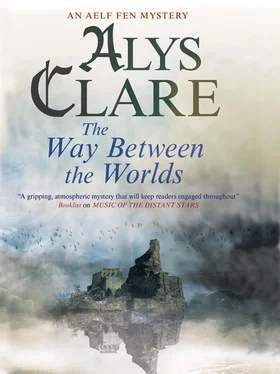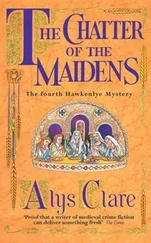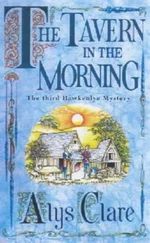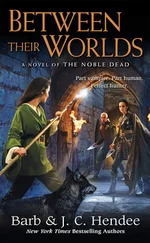Alys Clare - The Way Between the Worlds
Здесь есть возможность читать онлайн «Alys Clare - The Way Between the Worlds» весь текст электронной книги совершенно бесплатно (целиком полную версию без сокращений). В некоторых случаях можно слушать аудио, скачать через торрент в формате fb2 и присутствует краткое содержание. Год выпуска: 2012, Издательство: Ingram Distribution, Жанр: Исторический детектив, на английском языке. Описание произведения, (предисловие) а так же отзывы посетителей доступны на портале библиотеки ЛибКат.
- Название:The Way Between the Worlds
- Автор:
- Издательство:Ingram Distribution
- Жанр:
- Год:2012
- ISBN:нет данных
- Рейтинг книги:3 / 5. Голосов: 1
-
Избранное:Добавить в избранное
- Отзывы:
-
Ваша оценка:
- 60
- 1
- 2
- 3
- 4
- 5
The Way Between the Worlds: краткое содержание, описание и аннотация
Предлагаем к чтению аннотацию, описание, краткое содержание или предисловие (зависит от того, что написал сам автор книги «The Way Between the Worlds»). Если вы не нашли необходимую информацию о книге — напишите в комментариях, мы постараемся отыскать её.
The Way Between the Worlds — читать онлайн бесплатно полную книгу (весь текст) целиком
Ниже представлен текст книги, разбитый по страницам. Система сохранения места последней прочитанной страницы, позволяет с удобством читать онлайн бесплатно книгу «The Way Between the Worlds», без необходимости каждый раз заново искать на чём Вы остановились. Поставьте закладку, и сможете в любой момент перейти на страницу, на которой закончили чтение.
Интервал:
Закладка:
‘In place round his neck?’ I persisted.
‘Hmm? Yes, that’s right.’
I looked quickly at the dead man’s neck. The indentations made by the garrotte were clearly visible — perhaps a little more deeply marked around the back of the neck than the front, although it was hard to be sure.
I looked up at Gurdyman. He had put down the leather braid and was now handling the ropes that were wound around the man’s wrists and ankles, running his fingers delicately along them as he spoke, turning them over and over in his hands. ‘That is very interesting,’ he said softly.
‘What’s interesting?’
He looked up at me. ‘The rope is made of fibres from the honeysuckle plant.’
I knew from his expression that this was significant, but I did not know why. I was about to ask when he put the ropes down and once more stepped up close to the body. He put one hand on the lower jaw and, holding the head steady with the other, forced the mouth open. He peered inside — the man, I saw, had had good teeth — and looked carefully at the tongue and around the gums. ‘Hmm,’ he said again. He had something on the end of his forefinger, and it looked a little like the small, pale, empty skin of a berry.
‘What’s that?’ I demanded.
‘I am not sure,’ he admitted. Then, as if it were something we did together every day, he said matter-of-factly, ‘I need to see what is in his stomach. We shall have to cut him open.’
My apprenticeship as a healer had not prepared me for anything like this. Hoping I would not disgrace myself by fainting or being sick, I steeled myself, took a deep breath and went to stand at my mentor’s side. He told me to find a bowl of some sort, and I went to the shelves behind the table and selected a pottery dish. Gurdyman nodded his approval. ‘I shall remove the stomach in its entirety,’ he announced, ‘and we shall open it on the workbench over there.’ He indicated a bench beneath the shelves.
I watched as he cut a long slit from the corpse’s breast to its navel. Then he reached inside and extracted the bag of the stomach. I had half expected blood, and Gurdyman must have seen my expression. ‘He had a cut in his neck, and he has been in the water,’ he said. ‘The blood will have long ago left his body.’
That reminded me of something I had meant to ask. To take my mind off the fact that my companion was holding a human stomach in his hands and was just about to slice into it, I said, ‘How long has he been dead?’
Gurdyman frowned. ‘I cannot be sure, for peat is a natural preservative and sometimes bodies that look to have been only recently put into the ground were placed there hundreds of years ago.’
‘ Hundreds of years? Can a body last that long?’
‘Yes, child.’ He smiled at me. ‘Your own ancestors, you say, lived in the fens long, long ago. They might have treated their dead in this way, slipping the corpse into the peat so that it would be preserved for ever.’
He seemed to be implying that the ancient people had deliberately buried their dead in order to preserve them, but I just couldn’t believe it. ‘Did they-’ I began, but just then he pushed the point of his sharp knife into the stomach and cut it open, and I was so busy trying not to vomit that there was no room for anything else.
Edild told me once that the best way to overcome revulsion at some perfectly natural aspect of the human body is to concentrate hard on what it is teaching you. I did my best, making myself stare in wonder at what the inside of a stomach looked like, and after a few moments I felt I had won my private battle.
Gurdyman had poured the contents of the stomach into the pottery bowl. Using the end of his knife, he separated several tiny objects. Some looked like seeds, some like fruit of some sort. Those pale berries again.
‘Fetch some water, please, Lassair,’ Gurdyman said. I did as he asked and watched as, very carefully, he rinsed the seeds and the fruit fragments, washing off the tacky, viscous, smelly matter in which they were immersed. He placed them on the edge of the table on which the body lay. ‘Hmm,’ he said again. He beckoned me closer. ‘Look,’ he said. With the end of his knife he indicated a single seed. ‘Rye, I think.’
‘Yes.’ I nodded my agreement. ‘There are lots of them.’ I pointed to a piece of berry skin. ‘And the remains of lots of berries too.’ I tried to think of an edible berry that was white in colour, and all I came up with was an unripe mulberry or strawberry, and the fragments in the stomach did not resemble either. ‘What are they?’
Gurdyman looked up at me. ‘Mistletoe berries.’
‘But they are poisonous,’ I protested. ‘We use the plant, but only the young stems and the leaves, never the berries.’
‘Interesting,’ Gurdyman remarked. ‘What do you use them for?’
‘As a heart tonic and to treat water bloating. Oh, and as a sedative.’ Briefly, I struggled with my pride. I won. ‘Actually, it’s only my aunt who administers mistletoe. She says it’s too powerful a plant for me to use unsupervised.’
Gurdyman nodded. ‘You learn by watching her, and soon she will trust you to work alone, even with potentially lethal plants,’ he said.
That was just how Edild would have phrased it. For a wonderful moment she felt very close, and silently I sent her my love.
‘And now to the rye seeds,’ he went on, carefully picking one up on the tip of his knife. Then he selected another seed which, as I looked more closely, I could see was subtly different. It was darker in colour, and the shape of the seed was slightly distorted. I felt that I recognized it, and mentally I ran my eye along the top shelf in Edild’s room, where she keeps the more dangerous items.
Then I knew what it was. Perhaps my aunt’s spirit was still close by and she had prompted me. I sent her my thanks, just in case.
‘It’s ergot,’ I said. ‘It’s a fungus that grows on rye and, like mistletoe, is potentially lethal.’ Edild had warned me gravely about what ergot could do, and I thought the effects — hallucinations, agonizing, burning pains all over the body and, eventually, flesh rot in the extremities — sounded ghastly.
‘You and your aunt use it?’ Gurdyman asked.
‘Yes. Edild prescribes it in tiny doses to help in childbirth, when the afterbirth is reluctant to detach and come cleanly away. Also, she sometimes puts it in headache remedies, although only for the terrible half-head afflictions that make people see dizzying visions and occasionally lose a part of their sight.’
Gurdyman’s expression indicated his interest. ‘You are lucky in your teacher,’ he observed. ‘Your aunt has a rare skill.’
Grateful on Edild’s behalf, I gave him a beaming smile. Before I could thank him, he returned his attention to the tiny objects laid out before us. ‘So, we have mistletoe berries and rye grains, many of which are affected with ergot,’ he said, ‘in a medium that looks like gruel or soup. What are your conclusions?’
I had been so busy congratulating myself on identifying the ergot that I’d lost sight of why it was important. Now my mind began to race, putting the picture together. Very soon I had the answer.
‘Someone poisoned him,’ I said. I thought of his wounds, the stab in the neck and the garrotte. Now we knew that he’d been made to consume a poisoned soup as well. ‘Maybe his assailant gave him the gruel to make him unconscious, so that they could kill him at their leisure,’ I suggested. ‘If he did not suspect what was about to happen, then it would have been easier for the killer to invite him to share his gruel than to leap on him and stab him in the throat, or wind that garrotte round his neck.’
‘Quite so,’ Gurdyman agreed. ‘In any case, we know the poisoned food came first, because a man cannot eat once he is dead.’
Читать дальшеИнтервал:
Закладка:
Похожие книги на «The Way Between the Worlds»
Представляем Вашему вниманию похожие книги на «The Way Between the Worlds» списком для выбора. Мы отобрали схожую по названию и смыслу литературу в надежде предоставить читателям больше вариантов отыскать новые, интересные, ещё непрочитанные произведения.
Обсуждение, отзывы о книге «The Way Between the Worlds» и просто собственные мнения читателей. Оставьте ваши комментарии, напишите, что Вы думаете о произведении, его смысле или главных героях. Укажите что конкретно понравилось, а что нет, и почему Вы так считаете.












